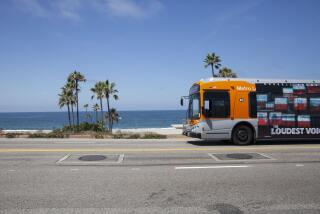New Look at Commuters
- Share via
The results of the 1990 Census Report on commuting patterns published June 22 were interesting, but unsurprising. I was bothered, however, by the tenor of remarks attributed to Cheryl Collier, the R&D; director of Commuter Transportation Services. I found her remarks betrayed a disturbing willingness to substitute moralistic judgment for factual information as an appropriate ground for policy-making.
As congestion has grown, commuters have shown a reluctance to leave their cars. Why? Among transportation officials there seems to have been a surprising unwillingness to try to answer this obvious question.
Collier seems to attribute the observations to stubbornness and habit: Commuters are bad guys who need to be penalized for the recalcitrant behavior.
Sound policy cannot be founded on prejudice. Statistics show that average workdays are increasing in length, and that more workers are in service industries. Those facts are suggestive. What is the variance in hours faced by individual commuters? How predictable are workers’ hours? How many solo commuters use their cars, even occasionally, at work? How predictable are these demands?
Perhaps transportation planners know the answers to these sorts of questions, but based on what I read in the paper and the policies I see being implemented, it doesn’t seem that way. Instead, I see empty car-pool lanes, van pools with no one riding, and empty buses emitting pollutants without control. These are very costly policies to be failing.
As an example, the LADOT Commuter Express recently instituted service from Granada Hills to Century City. The last bus leaves Century City at 6:10 p.m. Does LADOT seriously believe that the lawyers, accountants and other professionals or their support personnel can predictably count on getting out of their offices in time to catch a 6:10 bus?
Transportation officials must see their responsibility is to serve the public, not to judge the public.
JOHN DALY, North Hills
More to Read
Sign up for Essential California
The most important California stories and recommendations in your inbox every morning.
You may occasionally receive promotional content from the Los Angeles Times.










